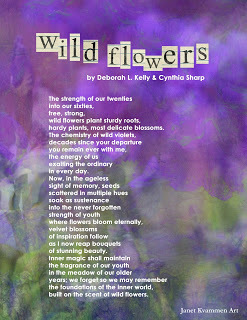Cynthia Sharp's Blog, page 4
September 27, 2018
Interview with Griffin Prize Winner Jane Munro
I recently spoke with The Federation of British Columbia Writers flash prose contest judge Jane Munro about her take on the craft of writing. These are some of her generous insights:
Cynthia: You’ve studied a variety of literary genres with your MFA in Creative Writing, MA in English and doctorate in Adult Education and gone on to publish many books and become a Griffin Prize winner. Could you tell us about your writing and editing process?
Jane: It’s slow, and – at best – surprising. I listen. Write down words as they come. Feel my way step by step: follow that thread through a labyrinth. Later – when I’ve forgotten what I wrote – I‘ll read it over. Tag what I like. Add bits, go further, explore, meet what’s hidden, recognize its structure, play. Eventually, when I’ve got something to print out, I’ll walk around the room and read it aloud. Finger hot spots: think. Finish it.
Ideally, I’ll then set it aside and work on something else. Often, when I come back to it, I’ll see what I hadn’t seen earlier.
I keep drafts. Once in a while, the piece will be best as it came first. Typically, I’ll find I’ve gone too far. Reading it aloud tells me a lot.
And then, there may be someone else’s response. It’s great to have a trustworthy reader who will raise questions and concerns. Are they valid? When I understand them, do I share them? Can I resolve them? Do the changes strengthen the work?
Yes, sometimes it happens quickly. But when that gift arrives, I may later notice how it drew on years – decades even – of reading, reflection, and writing. Learning. It might have started with a dream. I like to note dreams. Doing this connects me with parts of my mind that are less conscious. And, maybe, with imagery we share.
Cynthia: You write in both long and short forms. Is the process different when there is a tight word limit? How do you polish a short piece?
Jane: Even with long forms, each word needs to be essential. A tight word limit helps me focus. It’s a figuring out process. I’ll start long and pare down as I clarify the telling gesture. Or, gestures. What’s enough? What fits and works?
Cynthia: What advice has inspired you as a writer?
Jane: My grandfather – who was a painter, not a writer – used to say, “Art is suggestion; art is not representation.” I think this is true for writing, too. I’ve found it useful advice, especially for flash prose.
Cynthia: What do you look for when reading literature and what specifically grabs your attention in flash prose and other short genres?
Jane: It’s not always the same thing: insight – freshness – revelation of character – wit – swift depiction of a conflict – resonant language – a story’s power as an agent of change. However it does it, I’m looking for flash prose that will stay with me, that I’ll enjoy. Want to read aloud. Share with someone.
Cynthia: What role does structure play in flash prose, in your view?
Jane: I think of literature as architecture for imagination. So, structure is crucial. Flash prose creates a space for someone else to furnish. Dwell in.
What’s more, structure gives the writer’s imagination something to push against.
I knew an artist who made amazing weavings – huge, sculptural, striking. His rule was that he could not sew anything together. The entire piece had to be woven on a loom. Without that rule, he said, there were too many possibilities. Within its boundaries, his imagination could go wild.
Cynthia: Do you have any helpful tips for our members and readers entering the flash prose contest?
Jane: Trust yourself. Dance as if nobody’s looking. Then, make sure everything – each word, punctuation mark, decision you’ve made – fits and works.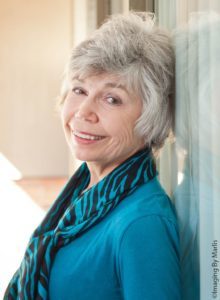 Remember to get your flash prose story in by October 1st, 650 words or under, $15 per entry, $10 for FBCW members. First prize is $350 and publication in Wordworks. Submit here by October 1
Remember to get your flash prose story in by October 1st, 650 words or under, $15 per entry, $10 for FBCW members. First prize is $350 and publication in Wordworks. Submit here by October 1
Cynthia: You’ve studied a variety of literary genres with your MFA in Creative Writing, MA in English and doctorate in Adult Education and gone on to publish many books and become a Griffin Prize winner. Could you tell us about your writing and editing process?
Jane: It’s slow, and – at best – surprising. I listen. Write down words as they come. Feel my way step by step: follow that thread through a labyrinth. Later – when I’ve forgotten what I wrote – I‘ll read it over. Tag what I like. Add bits, go further, explore, meet what’s hidden, recognize its structure, play. Eventually, when I’ve got something to print out, I’ll walk around the room and read it aloud. Finger hot spots: think. Finish it.
Ideally, I’ll then set it aside and work on something else. Often, when I come back to it, I’ll see what I hadn’t seen earlier.
I keep drafts. Once in a while, the piece will be best as it came first. Typically, I’ll find I’ve gone too far. Reading it aloud tells me a lot.
And then, there may be someone else’s response. It’s great to have a trustworthy reader who will raise questions and concerns. Are they valid? When I understand them, do I share them? Can I resolve them? Do the changes strengthen the work?
Yes, sometimes it happens quickly. But when that gift arrives, I may later notice how it drew on years – decades even – of reading, reflection, and writing. Learning. It might have started with a dream. I like to note dreams. Doing this connects me with parts of my mind that are less conscious. And, maybe, with imagery we share.
Cynthia: You write in both long and short forms. Is the process different when there is a tight word limit? How do you polish a short piece?
Jane: Even with long forms, each word needs to be essential. A tight word limit helps me focus. It’s a figuring out process. I’ll start long and pare down as I clarify the telling gesture. Or, gestures. What’s enough? What fits and works?
Cynthia: What advice has inspired you as a writer?
Jane: My grandfather – who was a painter, not a writer – used to say, “Art is suggestion; art is not representation.” I think this is true for writing, too. I’ve found it useful advice, especially for flash prose.
Cynthia: What do you look for when reading literature and what specifically grabs your attention in flash prose and other short genres?
Jane: It’s not always the same thing: insight – freshness – revelation of character – wit – swift depiction of a conflict – resonant language – a story’s power as an agent of change. However it does it, I’m looking for flash prose that will stay with me, that I’ll enjoy. Want to read aloud. Share with someone.
Cynthia: What role does structure play in flash prose, in your view?
Jane: I think of literature as architecture for imagination. So, structure is crucial. Flash prose creates a space for someone else to furnish. Dwell in.
What’s more, structure gives the writer’s imagination something to push against.
I knew an artist who made amazing weavings – huge, sculptural, striking. His rule was that he could not sew anything together. The entire piece had to be woven on a loom. Without that rule, he said, there were too many possibilities. Within its boundaries, his imagination could go wild.
Cynthia: Do you have any helpful tips for our members and readers entering the flash prose contest?
Jane: Trust yourself. Dance as if nobody’s looking. Then, make sure everything – each word, punctuation mark, decision you’ve made – fits and works.
 Remember to get your flash prose story in by October 1st, 650 words or under, $15 per entry, $10 for FBCW members. First prize is $350 and publication in Wordworks. Submit here by October 1
Remember to get your flash prose story in by October 1st, 650 words or under, $15 per entry, $10 for FBCW members. First prize is $350 and publication in Wordworks. Submit here by October 1
Published on September 27, 2018 18:04
September 4, 2018
Shipwreck
prime light
first sun on skin
bodacious, eternal
before stingy controllers marred
our path
first sun on skin
bodacious, eternal
before stingy controllers marred
our path
Published on September 04, 2018 16:30
September 2, 2018
Wax Poetic Interview for My New Poetry Book
I had a blast being interviewed about my new book, Rainforest in Russet, by the amazing literary team Pamela Bentley and R.C. Weslowski! You can catch the half hour discussion commercial free at this link: Cynthia Sharp on Wax Poetic Radio
Published on September 02, 2018 22:55
August 31, 2018
July Blossoms
the way the light feels first thing in the morningbefore the neighbor starts to smokeor chores are rememberedjust us, cool air, seagulls and eagles,all the scents of flowers on the windand a whole Sunday stretched out ahead


Published on August 31, 2018 10:13
August 29, 2018
How to Market Your Work
I had a fabulous time being interviewed along side Charles Clifford Brooks on the Michael Amidei show. Charles is pure inspiration, totally worth checking out!
How to Market Your Work - The Michael Amidei Show
These are some of the details we spoke about. I truly believe in balance, rest, self-care and harmony of inner and outer worlds. I think that writing and creative time need to be prioritized ahead of marketing and that we need to respect our personal limits. So, that being said, I also have a lot of fun when it comes time to launch a book. My newest full length poetry collection, Rainforest in Russet, has been getting me a lot of invitations to readings, radio shows and podcasts, including this one which focussed on the role of marketing and what authors can do to help sell and publicize their poetry books. The advice I give in the above podcast regarding working with Amazon's algorithms is to choose one specific hour on one specific day to get all of your friends, family and connections to buy your new release from Amazon and be ready to watch the numbers and ratings on your book's Amazon page and get a screenshot when you see your numbers jump. Within about 3 hours of the sales, your Amazon rankings will reflect the change and hopefully you will see your book climb the charts in your categories. Amazon bestseller lists update hourly, so one way to break out into the charts in your specific categories is to get a large number of sales within one hour, any hour and be watching so that you can see it happen. If you have an ebook in the Amazon Kindle program, it helps to take advantage of all the free giveaway days because they count as sales and help your numbers climb the charts, which can lead to more publicity, sales and profit, especially if you promote your free giveaway days in appropriate Facebook groups. That's how my ebook How to Write Poetry reached the number 1 place in its category and held it for a long time, then brought in sales money. Of course, I'm careful to always read the about section and rules in any Facebook group I join or promote in and follow them because this isn't just about one book - it's about building respectful relationships on a lifelong journey. Reciprocity is what it's all about and with Amazon, reviews generate sales. One of the things my publisher did for me with my How to Write Poetry ebook to get the reviews going was three and four way review exchanges of verified purchases (actual real sales from Amazon). This meant that my publisher reviewed writer A's book, writer A reviewed writer B's book, writer B reviewed writer C's book and writer C reviewed our book so that it's not as easy for Amazon to see that we are helping each other with legitimate reviews. If we're reviewing ebooks we need to read them all the way through because Amazon can see if they've been read, I've been told. As well, setting up Amazon giveaways has been helpful in building up followers so that now when I release a new book, I already have interested readers. Finally, I use all the free websites available, like having a Goodreads author page, doing blog exchanges with other writers and offering a short free sample or bonus material to readers when I post about my book on Facebook and Twitter, so that's it's not just one more announcement that I have a book. These are some of the strategies that have helped get books onto bestselling lists.
How to Market Your Work - The Michael Amidei Show
These are some of the details we spoke about. I truly believe in balance, rest, self-care and harmony of inner and outer worlds. I think that writing and creative time need to be prioritized ahead of marketing and that we need to respect our personal limits. So, that being said, I also have a lot of fun when it comes time to launch a book. My newest full length poetry collection, Rainforest in Russet, has been getting me a lot of invitations to readings, radio shows and podcasts, including this one which focussed on the role of marketing and what authors can do to help sell and publicize their poetry books. The advice I give in the above podcast regarding working with Amazon's algorithms is to choose one specific hour on one specific day to get all of your friends, family and connections to buy your new release from Amazon and be ready to watch the numbers and ratings on your book's Amazon page and get a screenshot when you see your numbers jump. Within about 3 hours of the sales, your Amazon rankings will reflect the change and hopefully you will see your book climb the charts in your categories. Amazon bestseller lists update hourly, so one way to break out into the charts in your specific categories is to get a large number of sales within one hour, any hour and be watching so that you can see it happen. If you have an ebook in the Amazon Kindle program, it helps to take advantage of all the free giveaway days because they count as sales and help your numbers climb the charts, which can lead to more publicity, sales and profit, especially if you promote your free giveaway days in appropriate Facebook groups. That's how my ebook How to Write Poetry reached the number 1 place in its category and held it for a long time, then brought in sales money. Of course, I'm careful to always read the about section and rules in any Facebook group I join or promote in and follow them because this isn't just about one book - it's about building respectful relationships on a lifelong journey. Reciprocity is what it's all about and with Amazon, reviews generate sales. One of the things my publisher did for me with my How to Write Poetry ebook to get the reviews going was three and four way review exchanges of verified purchases (actual real sales from Amazon). This meant that my publisher reviewed writer A's book, writer A reviewed writer B's book, writer B reviewed writer C's book and writer C reviewed our book so that it's not as easy for Amazon to see that we are helping each other with legitimate reviews. If we're reviewing ebooks we need to read them all the way through because Amazon can see if they've been read, I've been told. As well, setting up Amazon giveaways has been helpful in building up followers so that now when I release a new book, I already have interested readers. Finally, I use all the free websites available, like having a Goodreads author page, doing blog exchanges with other writers and offering a short free sample or bonus material to readers when I post about my book on Facebook and Twitter, so that's it's not just one more announcement that I have a book. These are some of the strategies that have helped get books onto bestselling lists.
Published on August 29, 2018 17:02
July 24, 2018
Wild Flowers
Published on July 24, 2018 13:04
July 7, 2018
My Rainforest In Russet Full Length Poetry Book Is Out
A tapestry of spirituality and nature set on the west coast of North America in the Cascadia rainforests, this full length poetry collection embodies the grace found in the wisdom of ancient trees as a way of moving through love, grief, sorrow and rebirth. $5.99 US Thanks for your support!
Buy Now
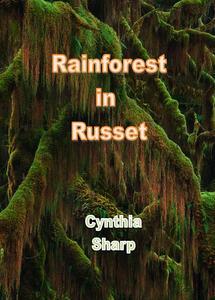
Buy Now

Published on July 07, 2018 13:21
May 26, 2018
Chemical Collision
They tell me that he married –I dream about him,a wizard on a bridgejuggling just one ball,looking back at methe way the body remembers.


Published on May 26, 2018 19:15
May 22, 2018
The Light Bearers in the Sand Dollar Graviton Part 1 is on the Shelves
Like many poets, I've tried my hand at a prose poetry novel, meaning the story includes lyrical description and rhythmic sentences along with a sense of adventure. Part 1 is officially out for readers who want to get a head start. It's not the whole story, which will be coming out in instalments, along with a fully complete novel in the fall.
Marcie Anderson has always yearned to understand her mysterious origins, so when Grandma tells her that on her thirteenth birthday, she can open the locket that will answer all her questions, she jumps right in. There is no turning back when she learns she is a Light Bearer and the only person who can rescue Zanfry Zabadon Starlight from the planet of machines where an evil princess is holding him hostage.
Purchase from Amazon
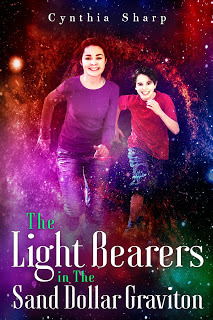
Marcie Anderson has always yearned to understand her mysterious origins, so when Grandma tells her that on her thirteenth birthday, she can open the locket that will answer all her questions, she jumps right in. There is no turning back when she learns she is a Light Bearer and the only person who can rescue Zanfry Zabadon Starlight from the planet of machines where an evil princess is holding him hostage.
Purchase from Amazon

Published on May 22, 2018 20:16
April 24, 2018
Short Story Contest Open to Submissions from All over the World
For those days when you want to flex your other writing muscles and dedicate yourself to the precision of crafting short stories, this is a great opportunity open to submissions from all over the world:
Submissions are open for a new short fiction contest sponsored by the Federation of British Columbia Writers (FBCW). Award-winning novelist Eileen Cook will be the judge of the 2018 B.C. Short, a competition for original, unpublished short stories. The word length is between 1,200 and 2,000 words. (No children’s fiction.) Stories must be written in English. First prize is $350. “The Federation of British Columbia Writers is deeply committed to supporting and inspiring writers,” said FBCW president Ann Graham Walker. “We’re keeping the entry fees affordable, and hoping to see a lot of participation.”
Novelist Eileen Cook has been named the judge of the inaugural B.C. Short. “We’re thrilled to have Eileen as the judge for this year’s contest,” said organizer Cynthia Sharp, a Vancouver writer on the board of the FBCW. “Her work is powerful, and her eye for story is impeccable.” Eileen is a multi-published author with novels in eight languages. Her books have been optioned for film and TV. They include With Malice, Remember, Year of Mistaken Discoveries, The Almost Truth, Used to Be and Do or Di. She is a popular speaker at conferences both in the U.S. and in Canada, provides writing/editorial coaching, and is a mentor/instructor for the Simon Fraser University Writer’s Studio, The Write Potential and The Creative Academy.
The entry fee is $15. Members of the FBCW pay only $10 to enter. Entrants should use Submittable. The name of the entrant must not appear anywhere on the entry itself. Work must be original and not previously published. Submissions must be in MS Word, PDF or RTF format, in Times New Roman 12 point font. Electronic submissions only. The deadline for submissions is June 1, 2018. Winners will be announced on July 30, 2018. The winning entry will be published in WordWorks, the magazine of the Federation of BC Writers. Board members of the FBCW and their immediate family are not eligible to enter. Visit https://www.bcwriters.ca for more information about the Federation of British Columbia Writers.
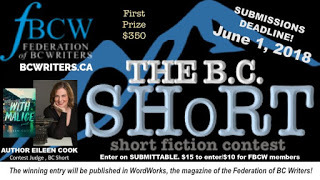
Submissions are open for a new short fiction contest sponsored by the Federation of British Columbia Writers (FBCW). Award-winning novelist Eileen Cook will be the judge of the 2018 B.C. Short, a competition for original, unpublished short stories. The word length is between 1,200 and 2,000 words. (No children’s fiction.) Stories must be written in English. First prize is $350. “The Federation of British Columbia Writers is deeply committed to supporting and inspiring writers,” said FBCW president Ann Graham Walker. “We’re keeping the entry fees affordable, and hoping to see a lot of participation.”
Novelist Eileen Cook has been named the judge of the inaugural B.C. Short. “We’re thrilled to have Eileen as the judge for this year’s contest,” said organizer Cynthia Sharp, a Vancouver writer on the board of the FBCW. “Her work is powerful, and her eye for story is impeccable.” Eileen is a multi-published author with novels in eight languages. Her books have been optioned for film and TV. They include With Malice, Remember, Year of Mistaken Discoveries, The Almost Truth, Used to Be and Do or Di. She is a popular speaker at conferences both in the U.S. and in Canada, provides writing/editorial coaching, and is a mentor/instructor for the Simon Fraser University Writer’s Studio, The Write Potential and The Creative Academy.
The entry fee is $15. Members of the FBCW pay only $10 to enter. Entrants should use Submittable. The name of the entrant must not appear anywhere on the entry itself. Work must be original and not previously published. Submissions must be in MS Word, PDF or RTF format, in Times New Roman 12 point font. Electronic submissions only. The deadline for submissions is June 1, 2018. Winners will be announced on July 30, 2018. The winning entry will be published in WordWorks, the magazine of the Federation of BC Writers. Board members of the FBCW and their immediate family are not eligible to enter. Visit https://www.bcwriters.ca for more information about the Federation of British Columbia Writers.

Published on April 24, 2018 17:53

